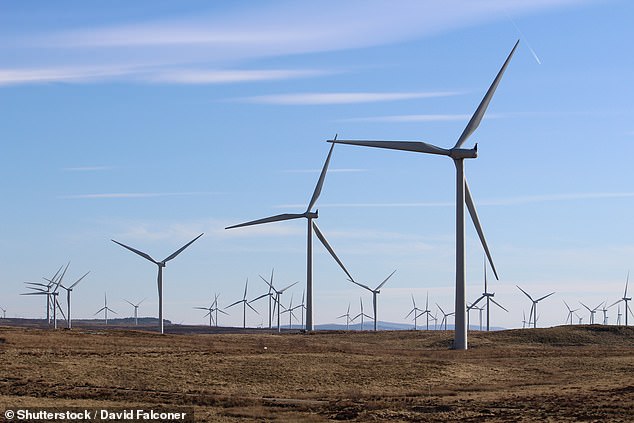The UK is set to waste more than £16 billion this decade after regulatory and planning failures have left Scotland producing more wind power than can be transmitted down South.
The cost, calculated by think-tank Carbon Tracker, is expected to find its way into higher electricity bills for cash-strapped households and businesses.
The problem arises because, although the UK is a wind super-power, there are not enough cables to take renewable electricity from Scotland, where most of it is produced, to England, where most of it is needed.
When bottlenecks arise, wind farms are paid to switch off their turbines, and gas stations in England are paid extra to supply the necessary electricity.
The system, known as curtailment, cost more than £700 million in 2023, with a further £140 million spent in January and February of this year alone.

Problem: There are not enough cables to take renewable electricity from Scotland to England
But costs are expected to shoot up, as offshore wind farms continue to grow, while cable construction remains mired in long drawn-out approval processes.
‘Wind curtailment could grow five-fold by 2030, costing £3.5 billion and wasting electricity equivalent to the annual consumption of more than 5 million households,’ says Lorenzo Sani of Carbon Tracker.
The price tag stems primarily from payments to gas providers, which have already made almost £1.5 billion by making sure Britain can keep the lights on when transmission cables cannot cope with Scottish wind.
Planning failures do not just hit UK purse-strings however. They also mean that enormous amounts of green power – up to 20 per cent in some months – is replaced by fossil fuels. Moves to address the problem are under way.
Last week, regulator Ofgem said it would fast-track a so-called ‘electricity superhighway’ between Scotland and England with an additional £2 billion in funds. The proposed subsea cables could transport wind-generated electricity between East Lothian and County Durham.
And earlier this year, ESO, the electricity system operator, unveiled Beyond 2030, a £58 billion plan to ensure power can be transported more effectively around the UK in future. Beyond 2030 estimates that electricity demand will be 65 per cent higher in 2035 than it is today, fuelled by a growing reliance on electric cars and heating.



